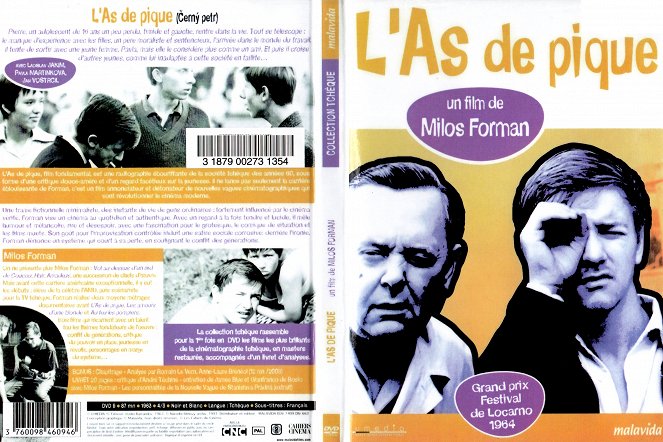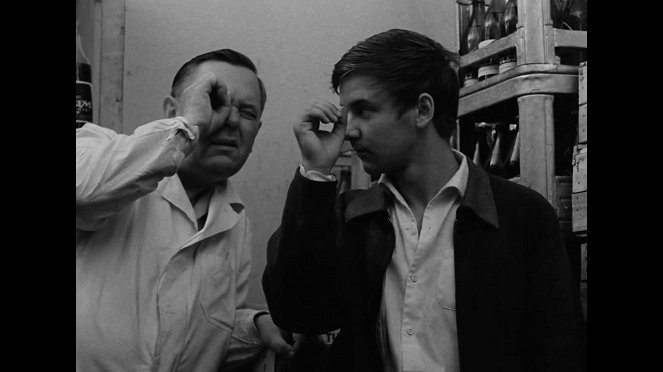Directed by:
Miloš FormanCinematography:
Jan NěmečekComposer:
Jiří ŠlitrCast:
Ladislav Jakim, Pavla Novotná, Jan Vostrčil, Vladimír Pucholt, Pavel Sedláček, Zdeněk Kulhánek, František Kosina, Josef Koza, Božena Matušková (more)Plots(1)
Black Peter is a wonderfully wry and provocative comedy about a young man growing up in a 1960s Czech provincial town. Taking the Best Film prize at the 1964 Locarno Film Festival, this early masterpiece of the emerging Czech New Wave brought to the screen something that Czechoslovak filmgoers weren't used to - an authentic testimony about the lives of young people. Forman made many important American films, but stayed true to his Czech roots. Black Peter, along with his other early works (which include his classic 1965 film A Blonde in Love), perfectly capture the authenticity and atmosphere of life in the eastern bloc during the early 60s, and the feelings of Czech teenagers in youthful rebellion on the cusp of the Prague Spring. (Second Run)
(more)Videos (1)
Reviews (5)
The first feature film by Miloš Forman, in which you can see how perfectly he was able to capture the characters of our little world. Some scenes are almost absurd and sound enchanting, especially in the sense that we have similarly nonsensical conversations among ourselves. This film wonderfully reflects the time... However, it's quite amusing that even after 50 years, it hasn't lost any of its relevance. We still encounter similar people, and we are still compelled to do similar things.
()
"May I ask?" - "But they're not playing..." - "Oh well. Then I'll come later." Even today, there are individuals like Pucholt's exhibition tatar Čenda. Moreover, anyone who has not experienced the feeling of slight loss on the journey of life has not experienced puberty. And it is precisely because of that, this experience from the position of an impartial observer is such a comfort.
()
A symphony of awkwardness, banality, everyday stereotypes, naivety, adolescent youth, and the rudeness of adults. In its time, this film literally represented a revolution because it broke all the ideas of what a film script and an engaged film should be. Today, it represents a classic for me that has not lost any of its impact even after half a century. The creators of the British series The Office brought this style to perfection, creating a much more compact work, where adolescent immaturity doesn't play a role but rather emphasizes the rudeness and awkwardness of adult characters in responsible positions. Overall impression: 75%.
()
After every other film from the Czechoslovak New Wave, I wonder how it’s possible that we’re not extinct. *** I still have an amusing memory of Black Peter from my university days, when at a college party a classmate glowingly explained the principles of the CNW to Indian and Korean students, which culminated in everyone high-fiving each other for immediately watching Black Peter, with the catch that I, who signed on to do the subtitles for the TV series, would translate it simultaneously. The Erasmus students picked up chips and beers and excitedly spread around the room in anticipation of the comedy that their classmate (perhaps Miloš?) had promised them. Sometime around the dialogue "Shall we dance?" "But there's no music." "Well, I'll come again." they had definitely become convinced that I didn't speak much English and was just making up the lines from scratch. So they slowly began dropping off, establishing a base on the balcony behind a wall of apologetic smiles. We finished the film with a classmate who kept insisting I keep translating from the English, even though there was no one to translate for. I didn't even mind, because as the Erasmians disappeared, so did the ban on smoking in the rooms. What was that classmate's name...?
()
– May I ask? – They’re not playing. A timeless portrait of a young man at a crossroads and a statement on the cyclical world of intergenerational misunderstanding. Forman’s first collaboration with Papoušek (and third with Passer) offers a series of beautifully unforced semi-improvised dialogue scenes (or monologues by the father, the model old-school patriarch). We could criticise Black Peter for its uneven rhythm (which, for example, Menšík took charge of in Loves of a Blonde), but the agony of awkwardness and embarrassed silence, which has no end, fits in with the effort to show youth without idealisation, as it really was (and probably still is) – hesitant, dependent, without ambition. The young protagonists don’t have role models whose example they could follow and they are unable to motivate themselves to do anything, and they don’t have the capacity to make decisions on their own. Petr either can’t or doesn’t want to be a store security guard watching over customers or a hardworking labourer. The only thing he’s interested in is Aša, who isn’t much interested in Petr (unless she needs some pickles from the store). With its dramaturgical laxity (several loosely connected episodes without any significant development of the plot or of the protagonist), the film goes as far as some experiments of the French New Wave (e.g. Breathless). However, the resulting effect is diametrically different – an approximation of reality, not destruction of it. The termination of the cycle of Peter’s minor embarrassing situations leading nowhere and his father's grand moralising speeches with a freeze-frame shot (disrupted by one peculiarly apathetic look), similar to the “freezing” of the characters in Intimate Lighting, is worth a thousand words. 90%
()
Gallery (10)
Photo © Malavida



Ads